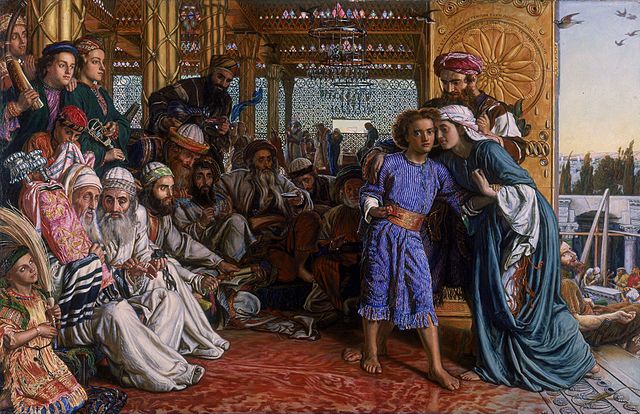
The Finding of Jesus in the Temple (William Holman Hunt, 1860)
Shalom!
As creatures of God, we are comforted by the steady rhythm of predictability in our daily routines and may earnestly work steadily to achieve our plans for the future. Living in our various cultures, we become accustomed, too, to patterns of behaviors, social customs, and ways of expression that reinforce harmony and personal exchanges. Our ways of being, individually and collectively, are handed down through the generations, manifesting as part of the greater experiential memory of our lives, our expectations of others, and the future. These orientations can form the fabric of our being and represent a vital part of our identity, setting the rhythm of our lifestyles and relationshi ps.
ps.
But, on occasion, we may come across a person who challenges us to change our patterns of thoughts, expectations, and behaviors to reach our potential as God's unique creatures. The words of a spiritual teacher can quickly strike and break away our outer cast to reach our core and draw forth the essential, diverse elements that make up the spiritual attributes of our person. Broken out of our mold, we are forced to confront the truth about God, ourselves, and our purpose and to reorder our lives and our relationships with God and with others. By growing into a deeper union with Him, we can more brightly reflect Him to others.
In The Rosary for World Peace Oratorio, in the Fifth Joyful Mystery, The Finding of Jesus in the Temple, just such an event is memorialized. God The Father announces: The Lord thy God will raise up to thee a PROPHET of thy nation and of thy brethren like unto me. Him thou shalt hear (Dt 18:15). I will put my words in his mouth, and he shall speak to them all that I shall command him. He that shall not hear his word, which he shall speak in my name, I will be the revenger (Dt 18:18-19). Jesus fulfills His Words by responding: Behold I come. In the head of the book it is written of me that I should do thy will: O My God, I have desired it, and thy law in the midst of my heart (Ps 39:8-9) . . . I will teach the unjust thy ways: the wicked shall be converted to thee (Ps 50:15).
In The Rosary for World Peace Oratorio, it is told in the New Testament that Jesus, then about twelve years of age, went to Jerusalem to celebrate the annual Pasch. After the festivities, His parents, Mary and Joseph, joined their relations to return to their home in Nazaret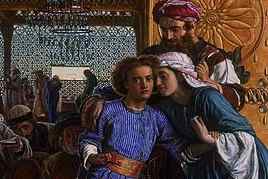 h. After a day's journey, they discover Jesus is not with them.
h. After a day's journey, they discover Jesus is not with them.
Distressed, they go back to Jerusalem. They search for Jesus for three days. Finally, they find Him in the Temple, sitting in the midst of the doctors, hearing them, and asking them questions (Lk 2:46). Mary was understandably upset, asking, Son, why hast thou done so to us? Behold thy father and I have sought thee sorrowing (Lk 2:48).
Jesus's sharp response marked a turning point. He evolves his role beyond that of their son and becomes their teacher, rightfully reordering their relationship with Him in God: He said to them: How is it that you sought me? Did you not know, that I must be about my father's business (Lk 2:49).
While Mary did not understand Jesus's response at that time, she kept all these words in her heart (Lk 2:51). And Jesus returned with them to Nazareth and was subject to them (Lk 2:51). 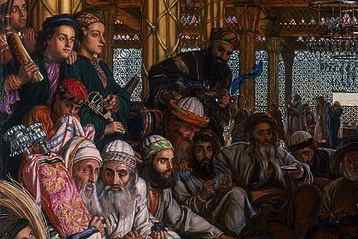
In this Mystery, we can contemplate the encounter of Mary with Jesus the Teacher. At a young age, He has accepted His destiny as the Son of God in the world. With confidence, He enters the Temple and interfaces with the highest doctors. There, the doctors of the Temple recognize they are encountering a rare person in Jesus.
When Mary and Joseph enter the Temple, Jesus makes it clear to them that He considers the Temple, not their house in Nazareth, to be His true home. Further, He turns and questions them regarding what manner they had sought Him: not why they sought Him, but how they went about seeking Him.
What was obvious to young Jesus was obscure to His parents. Although they had been told by the Angel Gabriel, Elizabeth, the shepherds, the Magi, and the prophets Simeon and Anna that Jesus was God-sent, now they had to confront the reality that their Son was emerging as prophesied. Jesus was not lost at all; He was found where He belonged: in the Temple, in the home of His Father.
This exchange marked a critical transition. Mary and Joseph now recognized that while they still served as Jesus's earthly parents, they were second to God's unfolding mission for their Son. This acceptance of God's will required sacrificial love on their part. They could choose to either dismiss the exchange that had occurred or to step into the mystical reality to fulfill their individual destinies as willed by God and gracefully gift Jesus with the freedom to fulfill His mission.
The doctors of the Temple, too, had a choice. They could not deny that a young man, of immense wisdom and unusual countenance, had entered into the heart of their sacred space and penetrated their thoughts: All that heard him were astonished at his wisdom and his answers (Lk 2:47). Young Jesus had caused a holy disturbance.What would the future hold for them and for Jesus? What roles were they destined to play in each others' lives? Would they choose to acknowledge the Presence of God in their lives in the person of Jesus or dismiss the Presence of God they had encountered?

We also can contemplate how we experience the forceful, agitating Presence of God, penetrating our time and space. It can be startling and unpleasant to have our routines, expectations, and patterns of thinking disrupted. It can be painful to have our relationships examined and changed, even if it is for our own benefit.
But once God's Truth is encountered, it becomes difficult to resist. Like Mary, we hold thoughts deep in our hearts. The spiritual seed that is planted soon grows, continually reflecting in our souls and discerning the degree of harmony between ourselves and God.
We may ask ourselves if the central beat of our lives is centered in ourselves, in another person(s), in our families; or in our careers and hobbies; or in our true home within the heartbeat of God. Like Mary, we can ponder in our hearts if we are receptive to the mirror God has brought before us, which may lead us to break our routines and reorder our thinking and our relationships to recenter our life patterns on Him.
In The Rosary for World Peace Oratorio, Jesus sings: Blessed
is the man that heareth me . . . He that shall find me, shall find life, and
shall have salvation from the Lord: But he that shall sin against me,
shall hurt his own soul. All that hate me love death (Prov 8:34-36). Jesus is clear in the choice He presents. Will we respond to God's call? Or, are we to
resist God's invasion into our domain.? Will we coast along with others and comply with the rigidity of human custom, as expected, or live more thoughtfully and act boldly, according to the promptings of the Word and  precepts of God, even if it disturbs others? Which consequence will we choose?
precepts of God, even if it disturbs others? Which consequence will we choose?
May we be blessed with the knowledge that, like Jesus, we are rooted in God: our natural home is in Him and with Him. May we trust that His loving intervention for us will ultimately lead us to His unending source of vitality and joy. His sweet liberty gives us the power to throw off the trappings of the world and the choice to evolve into a more perfect reflection of Him. Centered in God, and with the grace of fortitude, we can confidently choose to open wide the doors of our hearts to fulfill the unique purpose God has willed for each of us.
By transcending the boundaries of human creation, we can use the many gifts He has bestowed to bring His Light and Spirit of Love to others.
The Rosary for World Peace
. . . be part of the PEACE!
*Scripture verses are from The Holy Bible: Douay Rheims version. www.drbo.org
© 2013 Exposition Management International

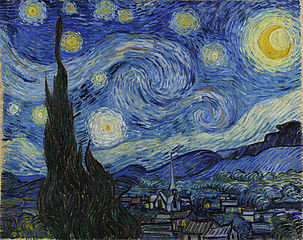
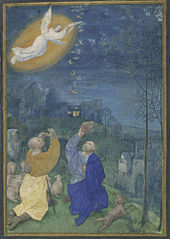
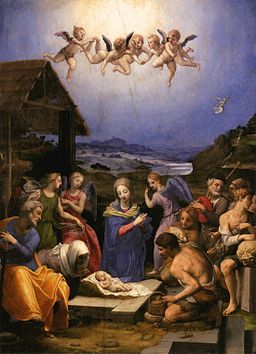 Poor and unassuming, charged with the dangerous work of defending the flock of their master, the shepherds were chosen to be among the first to welcome the newborn Christ Child, the Word become Flesh, who was born among them. This same Child would become in one Person both the Sacrificial Lamb and the Master Shepherd, the defender and protector of all the people of the world for generations to come.
Poor and unassuming, charged with the dangerous work of defending the flock of their master, the shepherds were chosen to be among the first to welcome the newborn Christ Child, the Word become Flesh, who was born among them. This same Child would become in one Person both the Sacrificial Lamb and the Master Shepherd, the defender and protector of all the people of the world for generations to come.
